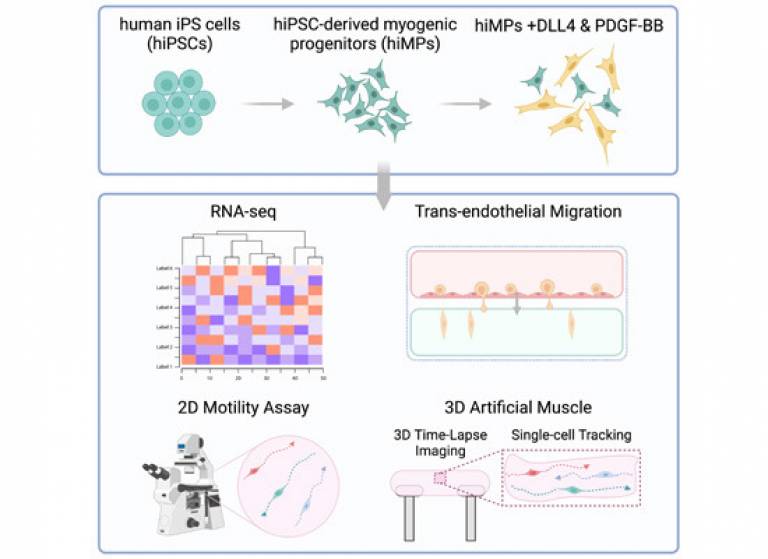Sung Choi and Saverio Tedesco publish EMBO paper on migration of iPSC-derived myogenic cells
28 September 2022
The latest study from Sung Choi and Francesco Saverio Tedesco (UCL Cell and Developmental Biology) describes an advanced framework to assess, model and enhance migration of human skeletal myogenic progenitor cells.

Their study describes an advanced framework to assess, model and enhance migration of human skeletal myogenic progenitor cells using platforms including induced pluripotent stem (iPS) cells, RNAseq, single cell profiling and tissue engineering.
- Activation of NOTCH and platelet-derived growth factor (PDGF) signalling pathways induces conserved transcriptional changes in mouse and human tissue- and iPS cell-derived myogenic progenitors (hiMPs).
- Combined activation of NOTCH and PDGF signalling via Delta-like 4 (DLL4) and PDGF-BB treatment assessed via single cell migratory profiling results in enhanced motility of hiMPs.
- Organ-on-chip and transwell assays show increased trans-endothelial migration of treated hiMPs not mediated by enhanced adhesion.
- A novel 3D assay modelling intramuscular migration using engineered muscles shows increased motility of treated hiMPs in a biomimetic environment.
In their work, the team developed tools to assess and a strategy to induce and enhance migration of iPSC-derived myogenic cells, with translational relevance for both intramuscular and intra-vascular cell delivery. Enhancing extravasation is a key milestone to develop future efficacious muscle cell therapies. Moreover, the technological platforms we have used for the validation of this treatment can be applied further to wider drug and therapy screening purposes.
Research article (Open Access):
'Assessing and enhancing migration of human myogenic progenitors using directed iPS cell differentiation and advanced tissue modelling' Sung Woo Choi, Giulia Ferrari, Louise A Moyle, Kirsty Mackinlay, Naira Naouar, Salma Jalal, Sara Benedetti, Christine Wells, Francesco Muntoni, Francesco Saverio Tedesco. EMBO Mol Med (2022) e14526 https://doi.org/10.15252/emmm.202114526
https://www.embopress.org/doi/full/10.15252/emmm.202114526
 Close
Close

